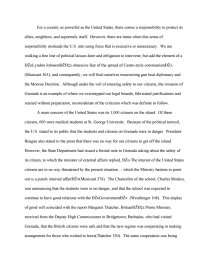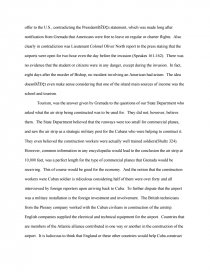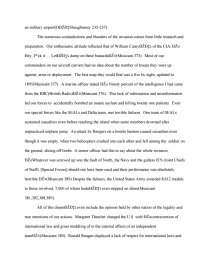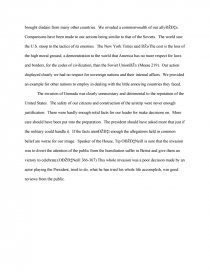Us History
Essay by review • August 21, 2010 • Essay • 1,305 Words (6 Pages) • 2,572 Views
For a country as powerful as the United States, there comes a responsibility to protect its allies, neighbors, and supremely itself. However, there are times when this sense of responsibility misleads the U.S. into using force that is excessive or unnecessary. We are walking a fine line of political laissez-faire and obligation to intervene, but add the element of a ÐŽoLyndon JohnsonЎЇs obsessive fear of the spread of Castro-style communismÐŽ± (Musicant 363), and consequently, we will find ourselves resurrecting gun boat diplomacy and the Monroe Doctrine. Although under the veil of ensuring safety to our citizens, the invasion of Grenada is an example of where we overstepped our legal bounds, fabricated justifications and reacted without preparation, inconsiderate of the criticism which was definite to follow.
A main concern of the United States was its 1,000 citizens on the island. Of these citizens, 600 were medical students at St. George University. Because of the political turmoil, the U.S. stated to its public that the students and citizens on Grenada were in danger. President Reagan also stated to the press that there was no way for our citizens to get off the island. However, the State Department had issued a formal note to Grenada asking about the safety of its citizen, to which the minister of external affairs replied, ÐŽo The interest of the United States citizens are in no way threatened by the present situation ... which the Ministry hastens to point out is a purely internal affairÐŽ±(Musicant 374). The Chancellor of the school, Charles Modica, was announcing that the students were in no danger, and that the school was expected to continue to have good relations with the ÐŽoGovernmentÐŽ± (Weinberger 108). This display of good will coincided with the report Margaret Thatcher, BritianЎЇs Prime Minister, received from the Deputy High Commissioner in Bridgetown, Barbados, who had visited Grenada, that the British citizens were safe and that the new regime was cooperating in making arrangement for those who wished to leave(Thatcher 330). The same cooperation was being offer to the U.S., contradicting the PresidentЎЇs statement, which was made long after notification from Grenada that Americans were free to leave on regular or charter flights. Also clearly in contradiction was Lieutenant Colonel Oliver North report to the press stating that the airports were open for two hour even the day before the invasion (Speakes 161-162). There was no evidence that the student or citizens were in any danger, except during the invasion. In fact, eight days after the murder of Bishop, no incident involving an American had arisen. The idea doesnЎЇt even make sense considering that one of the island main sources of income was the school and tourism.
Tourism, was the answer given by Grenada to the questions of our State Department who asked what the air strip being constructed was to be used for. They did not; however, believe them. The State Department believed that the runways were too small for commercial planes, and saw the air strip as a strategic military post for the Cubans who were helping to construct it. They even believed the construction workers were actually well trained soldiers(Shultz 324). However, common information in any encyclopedia would lead to the conclusion the air strip at 10,000 feet, was a perfect length for the type of commercial planes that Grenada would be receiving. This of course would be good for the economy. And the notion that the construction workers were Cuban soldier is ridiculous considering half of them were over forty and all interviewed by foreign reporters upon arriving back to Cuba. To further dispute that the airport was a military installation is the foreign investment and involvement. The British technicians from the Plessey company worked with the Cuban civilians in construction of the airstrip. English companies supplied the electrical and technical equipment for the airport. Countries that are members of the Atlantic alliance contributed in one way or another in the construction of the airport. It is ludicrous to think that England or these other countries would help Cuba construct an military airport(OЎЇShaughnessy 235-237).
The numerous contradictions and blunders of the invasion comes from little research and preparation. Our enthusiastic attitude reflected that of William CaseyЎЇs of the CIA, ÐŽo Hey, F*ck it .... LetЎЇs dump on these bastardsÐŽ±(Musicant 373). Most of our commanders on our aircraft carriers had no idea about the number of troops they were up against, arms or deployment. The best map they could find was a five by eight,
...
...



